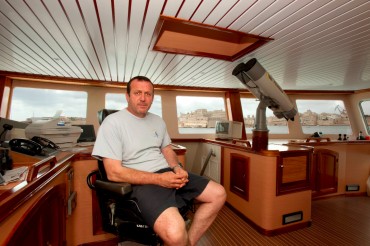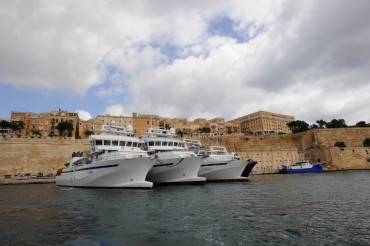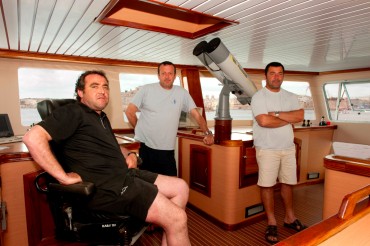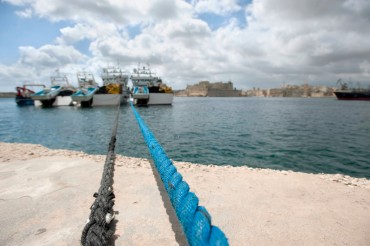OCEAN 71 – How would you describe the beginning of the 2010 bluefin tuna fishing season?
Généreux Avallone — Today, for us fishermen, it is a disaster! The fishing period, reduced to a month between May 15 and June 15, has been decided by the ICCAT (International Commission for the Conservation of Atlantic Tuna, organization in charge of assessing and managing the stocks of bluefin tuna in the eastern Atlantic and the Mediterranean) for a reason I don’t understand. It is not a good period for seine fishing in which we use a 2.5 kilometer net to trap bluefin tuna alive. For us to catch large tuna, the fish has to come close to the surface. It is possible only when the sea is calm and reaches temperatures between 21 and 24°C. That is, in general, from the end of June. Today it is June 2, we have not caught one kilo of tuna. I don’t know if we’ll be able to catch the 440 metric tons of the quota we have been allotted for three boats in the ten days we have left. I’m really afraid.
O71 – Do you fear lacking time or did the tuna vanish as said by NGOs and some scientists?
G.A. — There is bluefin tuna, I am certain of that. For proof, large quantities of tuna were caught a few days ago in the almadrabas of Spain and Morocco (a traditional fishing method performed along the coasts in which fishermen install a maze of nets in which the tuna get trapped before being captured manually) as well as by the Maltese longliners (fishing vessels trailing long lines with thousands of baited hooks). They have all made their quotas in less than a week! The fish is there but it is not coming to the surface yet. We have asked the ICCAT to extend our fishing period by four or five days if we cannot make our quota by June 15. On my three boats I have forty family men to pay and huge expenses. We are not here for fun, we are here to work. We are not asking for much. We are just asking for time to make the quota we have been allotted. That’s all.
071 – But numerous scientific reports show that the bluefin tuna population would be on the verge of extinction…
G.A. — For the time being, we are allowed to work over a period during which the water is still too cold. Besides, with the northwest wind which has been blowing over Malta for several days, we are not about to catch fish. It is easy for the NGOs to say: « See, there is no more bluefin tuna… The tuna vessels have not caught any! » Of course, we are not given enough time. If we had wanted to catch tuna weighing 30 to 50 kilograms, we would not have come here (to Malta). We would have stayed off our coasts in the Gulf of Lion. We would have long made our quota!
O71 – So, according to you, there is still bluefin tuna in the Mediterranean? What some scientists and NGOs have been saying makes no sense?
G.A. — There is bluefin tuna everywhere. It just takes the will to find it and to know where to look. Today, nobody wants to see. A scientific research program is to be launched with the ICCAT. They are using planes, but if they are not at the right place at the right time, they won’t see any tuna… We have been fishing tuna for fifty years, we know where they are and when.
O71 – Why won’t they listen to you?
G.A. — For the past three years we have been offering research teams to come with us on our boats after the fishing season. We want to show all these people (scientists, journalists and even NGOs) tuna schools so they can see for themselves. They will see scores of fish. It’s enormous. That’s all we’ve been asking for. The problem is that nobody wants to hear this.
O71 – Listening to you, one would be under the impression there are too many bluefin tuna…
G.A. — You’ll see, if we go on like this, in four or five years time, we’ll get paid to go fishing because indeed there will be too much tuna. This fish is at the top of its food chain. Tuna has no predator but humans. There are no more sardines or anchovies in the Gulf of Lion. Our French trawlers are in a lot of trouble these days. And why? These fishes are eaten by tuna. We’re not going after whales! Let’s be serious.
O71 – But this year, in 2010, some fishermen, notably the Italians, have decided not to go fishing… There must be a problem, don’t you think?
G.A. — The problem the Italians have is simple. They have 49 tuna purse seiners. Among those, some have quotas set at 10, 20, 30 sometimes 100 metric tons. Italy has asked its seiners to proceed as French seiners. Owners were asked to group their fleets so that each boat should have a quota of at least 100 metric tons for the season to be profitable. The problem is that the Italians could not reach an agreement. None of them. So the government put everything on hold. The government even went further as they made a list of 22 ships to be dismantled before the end of the year. They did not want to find an agreement, the Italian State has decided for them. But when you listen to Greenpeace, it is an entirely different story. « The Italian have done a good deed, they decided to apply the moratorium. » They have applied the moratorium not because they wanted to but because they could not get organized…
O71 – Do you feel uncomfortable because of the current presence of NGOs like Greenpeace in Malta?
G.A. — Today we are in Valletta. French and Spanish seiners have been fishing in the Balearic Islands for several days… and where are Greenpeace’s two largest ships? In Malta. We have had bad weather for two weeks, we are stuck in the harbor, while the others are fishing in the Spanish islands… good for them, but we don’t understand what the environmentalists are looking for harder in Malta than elsewhere. Their message makes no sense when I hear on television that bluefin tuna will be gone in two years time. How can they know? They don’t know. I’m not judging, but people in France get brainwashed without knowing a thing about the sea. And the only ones to be heard are Greenpeace and the WWF. And now there is also Sea Shepherd… I don’t even know who those are! The problem is that a journalist will be more interested in saying that tuna is gone and to follow NGOs than to write about fishermen who go to work.
O71 – But you are not talking very often in the media…
G.A. — We are fishermen, we are not used to communicating. It’s probably a fault. But who is going to listen to us these days?
O71 – Today, are you expecting actions from the NGOs?
G.A. — What we fear is that Greenpeace should launch operations against us as we are fishing perfectly legally. I am not against quotas, restrictions, regulation and controls —we have ICCAT inspectors on board— on the contrary! But we should be able to work normally. We already have enough problems with the weather conditions.
O71 – In your opinion, what have they achieved so far?
G.A. — They have achieved an important thing. They have ruined the small tuna market in Europe. Ten years ago, before Japan became the only country to buy bluefin tuna, we would catch the fish when it weighed 15 to 20 kilos. We would call that the first season… it lasted from March to May, then September and October. People probably don’t remember now, but the fish was destined to a real European market. One would eat tuna in France, Italy, Spain… In summer, it would be like the sardines you barbecue today. Then we would go fishing for large tuna. It allowed us to fish eight months of the year.
O71 – In these years, some went a little too far…
G.A. — Yes, that’s true. In the years 2001-2003, it somewhat turned into a free for all. The problem came from countries like Italy, Turkey, Tunisia… Mediterranean countries who took interest in bluefin tuna later than the others. At that time, we started seeing nets on boats nobody knew where they came from, and fish tuna like everybody else. Some order had to be restored because we were heading to disaster. One year, there were 600 to 700 boats fishing tuna! Boats which had no quotas, no license… it was crazy. The day Greenpeace came along, it brought a little order. For us, who have been fishing for fifty years, it was good.
O71 – You, the bluefin tuna fisherman, you are telling us that you approve of Greenpeace action?
G.A. — In the beginning, the pressure exerted by NGOs was good for fishermen because it put some sense in a situation that had become uncontrollable. But today, their fight has become absurd. We have reached the other extreme. Because of their stubbornness, companies like ours are bound to die. We follow the rules. We have quotas. But we cannot meet them. It has become totally absurd.
O71 – This year, will your 440-ton quota be enough to cover expenses for the season?
G.A. — Yes. If we are able to catch 440 tons, the season will be profitable. Our sailors will get a decent paycheck, it’s true. But one has to realize it is a month spent fishing for a whole year of work… Someone making 1300 to 1500 euros on land will make more than our sailors. It will not be much but we’ll manage to live.
O71 – Yet one regularly hears that bluefin tuna sells for a little fortune in Japan…
G.A. — We do not sell tuna directly to Japan. We catch them alive for Mediterranean fish farmers who fatten them to later sell them to Japanese companies. The prices are not the same. For fishermen the price of fish is set at 6 euros per kilogram, it is higher than last year. Given that the quotas have been reduced, prices automatically go up. It is one of the good aspects of the reduction of quotas. We do not have to catch large quantities of fish to make a living. Then, the prices set by the farmers for their Japanese buyers, it is none of our business.
O71 – In past years Sète-based fishermen have been harshly criticized as French boats were registered in Libya to go work in Libyan waters…
G.A. — There is a simple explanation for that. Everywhere in the world, territorial waters extend at 12 nautical miles (22 kilometers) from the baseline (mean low-water mark). But, five years ago, Gadhafi decided overnight to push the limit at 74 nautical miles! What right did he have to do that? There, nobody peeped. Suddenly we were no longer allowed to fish in this tuna-rich area. We registered our French boats in Libya to be able to continue fishing in what used to be international waters.
071 – Do you feel that today things have fallen back in line, that the fishing capacity is more suited to fish stocks?
G.A. — No. We have now reached the other extreme. Last year, there were 400 boats out at sea. One has to know that the ICCAT has requested that the fishing fleet should be reduced by 70%. This year, there are only 80 tuna fishing vessels left! Given the time we have (one month), the new quotas and the small number of boats… If it goes on like this, when midnight comes on June 14, we will not have made our quotas. It has become totally insane!!!
O71 – But technological improvements on modern ships have increased fishing capacity. Fleet reductions were necessary?
G.A. — What the ICCAT wants to do is keep only boats for which quotas are set at 20, 40 or 50 metric tons. But they know that given the current tuna quantities and prices, boats will not be economically viable. They want to get rid of all those who do not have sufficient quotas. We are still lucky. A few years ago, we still felt there was a future in tuna fishing. We have built several boats. We had five boats and this year we are down to three. It has allowed us —by selling one boat and converting another to fry transport, to group the quotas of the five seiners on three units. But when someone having only one boat sees quotas reduced, there is no other choice than quitting. If the ICCAT continues to crush everybody, we will also be gone!
O71 – In the years 2000, almost all European tuna vessels have received government aid for seine fishing. Are you under the impression that the French State has turned its back on you by declaring to be favorable to the listing of bluefin tuna as an endangered species?
G.A. — It has become a political issue. Elections were approaching when the State took sides with the environmentalists. It was necessary to secure green votes. Then Prince Albert of Monaco proposed a full moratorium on bluefin tuna. This proposal was turned down because it lacked sufficient grounds… But, between you and me, it is indeed Monaco that introduced an invasive seaweed which has been destroying part of the wildlife and flora in the Mediterranean for twenty years… Now, they are giving lessons… We are fishermen. We are not politicians.
O71 – With all this pressure, have you ever considered a shift to other fishes or simply quit fishing?
G.A — Tuna fishing has been a family activity for three generations. Then, there are other owners of tuna fishing vessels, even in Sète, who started working tuna eight or ten years ago. Those are gone. For my part, I don’t want to quit. We will be the last to quit. What do you want me to do? Tuna is my trade. We are building smaller fishing boats to diversify our activities, to keep our sailors, our captains and first mates and fish sardines. So we will not lose all our workforce. Why would you want us to go fish other fishes? We like tuna.
O71 – But you realize that you are playing the villains today?
G.A. — So we are the villains… It is the way it is. We live in a world that has grown concerned with the environment. We have to stop fishing, stop eating, stop everything. We don’t know how we will live…
O71 – How do you see your future?
G.A. — Today, we are nearly over. The future of this trade… depends on scientists. If we manage to show them there is tuna, we might have a chance to survive. Otherwise, I don’t think we have a future.



